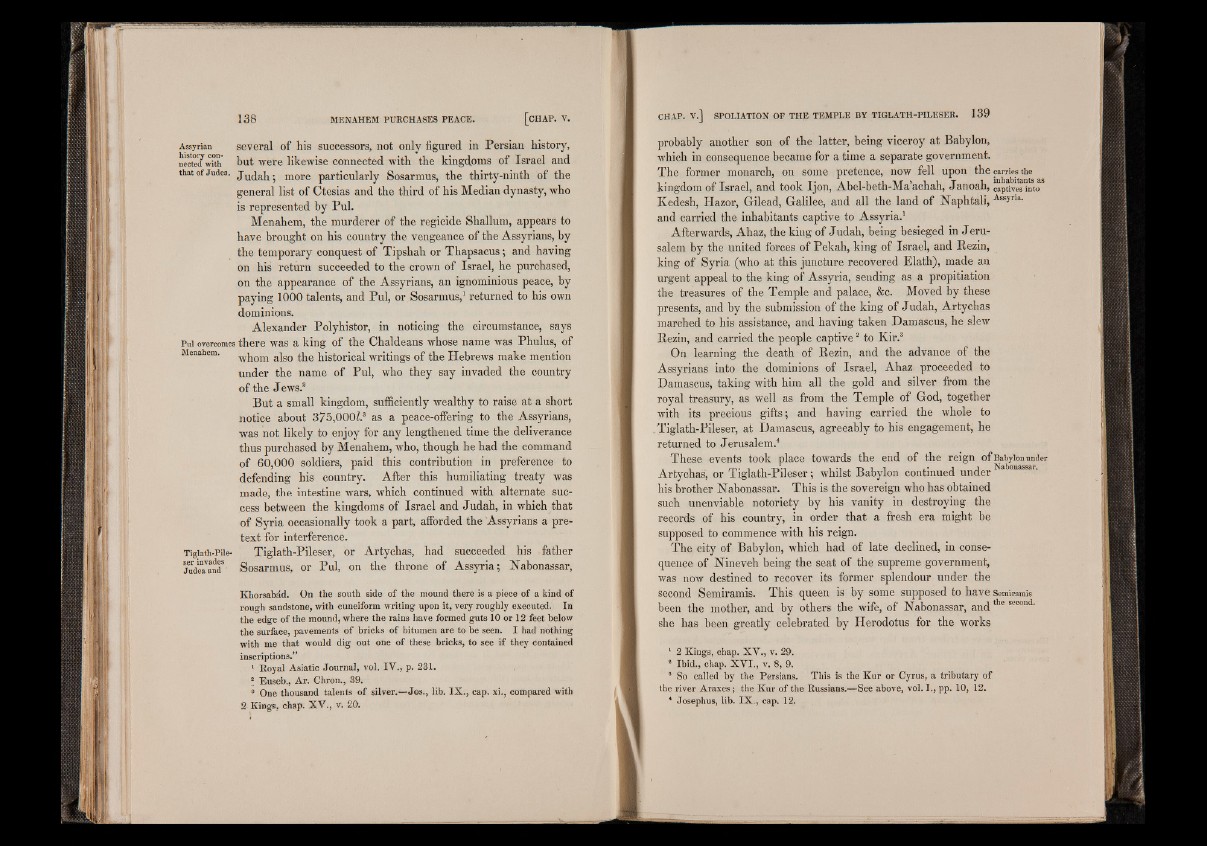
Assyrian several of his successors, not only figured in Persian history,
necteZwith but were likewise connected with the kingdoms of Israel and
that o f Judea, more particularly Sosarmus, the thirty-ninth of the
general list of Ctesias and the third of his Median dynasty, who
is represented by Pul.
Menahem, the murderer of the regicide Shallum, appears to
have brought on his country the vengeance of the Assyrians, by
the temporary conquest of Tipshah or Thapsacus; and having
on his return succeeded to the crown of Israel, he purchased,
on the appearance of the Assyrians, an ignominious peace, by
paying 1000 talents, and Pul, or Sosarmus,1 returned to his own
dominions.
Alexander Polyhistor, in noticing the circumstance, says
Pal overcomes there was a king of the Chaldeans whose name was Phulus, of
Menahem. whom aiso the historical writings of the Hebrews make mention
under the name of Pul, who they say invaded the country
of the Jews.2
But a small kingdom, sufficiently wealthy to raise at a short
notice about 375,000Z.3 as a peace-offering to the Assyrians,
was not likely to enjoy for any lengthened time the deliverance
thus purchased by Menahem, who, though he had the command
of 60,000 soldiers, paid this contribution in preference to
defending his country. After this humiliating treaty was
made, the intestine wars, which continued with alternate success
between the kingdoms of Israel and Judah, in which that
of Syria occasionally took a part, afforded the 'Assyrians a pretext
for interference.
Tigiath-Me- Tiglath-Pileser, or Artychas, had succeeded his father
ju'deZanf' Sosarmus, or Pul, on the throne of Assyria; Nabonassar,
Khorsabdd. On the south side of the mound there is a piece of a kind of
rough sandstone, with cuneiform writing upon it, very roughly executed. In
the edge of the mound, where the rains have formed guts 10 or 12 feet below
the surface, pavements of bricks of bitumen are to be seen. I had nothing
with me that would dig out one of these bricks, to see if they contained
inscriptions.”
1 Royal Asiatic Journal, vol. IV ., p. 231.
I Euseb., Ar. Chron., 39.
3 One thousand talents o f silver.—Jos., lib. IX ., cap, xi., compared with
2 Kings, chap. XV ., v. 20.
probably another son of the latter, being viceroy at Babylon,
which in consequence became for a time a separate government.
The former monarch, on some pretence, now fell upon the carries the
kingdom of Israel, and took Ijon, Abel-beth-lMa achah, Janoah, captives into
Kedesh, Hazor, Gilead, Galilee, and all the land of Naphtali, AssJna-
and carried the inhabitants captive to Assyria.1
Afterwards, Ahaz, the king of Judah, being besieged in Jeru-
salem by the united forces of Pekah, king of Israel, and Rezin,
king of Syria (who at this juncture recovered Elath), made an
urgent appeal to the king of Assyria, sending as a propitiation
the treasures of the Temple and palace, &c. Moved by these
presents, and by the submission of the king of Judah, Artychas
marched to his assistance, and having taken Damascus, he slew
Rezin, and carried the people captive2 to Kir.3
On learning the death of Rezin, and the advance of the
Assyrians into the dominions of Israel, Ahaz proceeded to
Damascus, taking with him all the gold and silver from the
royal treasury, as well as from the Temple of God, together
with its precious gifts; and having carried the whole to
Tiglath-Pileser, at Damascus, agreeably to his engagement, he
returned to Jerusalem.4
These events took place towards the end of the reign of Babylon under
Artychas, or Tiglath-Pileser; whilst Babylon continued under Nabonassar-
his brother Nabonassar. This is the sovereign who has obtained
such unenviable notoriety by his vanity in destroying the
records of his country, in order that a fresh era might be
supposed to commence with his reign.
The city of Babylon, which had of late declined, in consequence
of Nineveh being the seat of the supreme government,
was now destined to recover its former splendour under the
second Semiramis. This queen is by some supposed to have Semiramis
been the mother, and by others the wife, of Nabonassar, andthe second-
she has been greatly celebrated by Herodotus for the works
1 2 Kings, chap. XV ., v. 29.
! Ibid., chap. X V I., v. 8, 9,
8 So called by the Persians. This is the Kur or Cyrus, a tributary of
the river Araxes; the Kur o f the Russians.—See above, vol. I., pp. 10, 12.
* Josephus, lib. IX ., cap. 12.